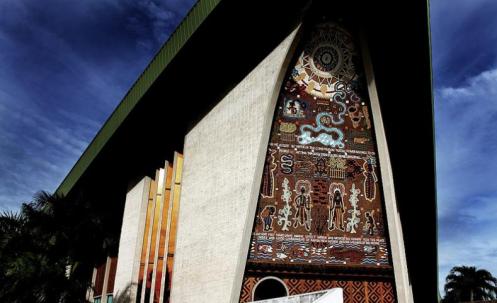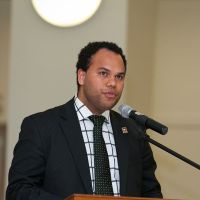
Papua New Guinea’s “Number 1 Daily” – the Post-Courier – and its award-winning political reporter, Gorethy Kenneth, have found themselves in the shameful position of committing the number one cardinal sin in journalism – plagiarism.
It is a most serious offense and goes against the Media Council of Papua New Guinea’s General Code of Ethics for News and Media – which the Post-Courier subscribes to, or claims to do.
On August 9, 2012 – in their 11,000 Edition since 1969, the Post-Courier ran a story on their front page titled “O’Neill delays Cabinet line-up” and with the sub-heading “Leo Dion is deputy PM”.
In that front-page article, Gorethy Kenneth quoted The Garamut and plagiarized a line from a post I had written and published on August 8, 2012 regarding Peter O’Neill’s appointment of Leo Dion as deputy prime minister, all without attributing the quote or plagiarized line to The Garamut.
In objection to the Post-Courier’s blatant plagiarism of my blog post, I wrote a letter to the Editor, Frank Genaia, and Editor-in-Chief of the Post-Courier, Blaise Nangoi.
I also sent a copy of the letter to Mr Peter Chegwyn – the Chairman of South Pacific Post Ltd, the company which owns the Post-Courier, and also to the author of the offending piece of journalism, Gorethy Kenneth.
I have yet to receive any response to my letter.
In addition to writing the letter, I also posted a thread on the popular PNG Facebook group Sharp Talk – which to date has generated 107 ‘Likes’ and 255 comments.
An interesting facet of posting my concerns on Sharp Talk was the general feedback received that it wasn’t the first example of plagiarism by the Post-Courier. Other people too mentioned that they had their work copied and pasted by not just the Post-Courier, but also by other media in PNG too.
One of the most concerning examples must be the Post-Courier’s inexplicable copying and pasting of an article by Australian journalist Oliver Milman, who recently wrote a piece on deep-sea mining in PNG for The Guardian on August 6, 2012.
Ironically, that article was published on the Post-Courier’s front page too – but on August 8, 2012 (Edition 10,999) – one day before bits of my blog post made their way to the Post-Courier’s cover to be distributed around the country.
It was also ‘written’ by the same journalist in question – Gorethy Kenneth.
Fellow PNG blog, Papua New Guinea Mine Watch, picked up on the fact that the Post-Courier and Gorethy Kenneth had incredulously copied large sections of Milman’s work for The Guardian and claimed it as their own original piece of journalism without an iota of recognition whatsoever.
That blog post was consequently picked up by The Guardian which responded by publishing their own story shaming the Post-Courier in one of their columns on August 13, 2012, while highlighting the connection between the Post-Courier and Rupert Murdoch’s phone-hacking scandal:
“But the broom, we fear, hasn’t quite swept clean other parts of the Murdoch empire, where still there are alleged transgressions that would worry Lord Justice Leveson. One such is a big story that appeared last week on the front page of Murdoch’s Post-Courier in Papua New Guinea.”
It is one thing for the Post-Courier to be pinged for plagiarism by a blogger, and another thing altogether for the same paper to be publicly embarrassed by one of the largest newspapers in the United Kingdom.
Furthermore, two cases of plagiarism in consequent editions, by the same author and published on the front-page as the paper’s lead story of the day is beyond alarming – it’s a signal that something is not quite right with the Post-Courier.
The Post-Courier’s brazenness at copying and pasting large portions of other people’s words is truly gob-smacking; and their passing on of this work as their own without any relevant attribution or recognition is utterly disgraceful and is simply unacceptable.
At the end of the day, the buck stops with the Editors of the paper, and it appears in this instance – and without any sort of response or apparent effort expended to defend their paper’s integrity or reputation – that both Editor Frank Genaia and Editor-in-Chief Blaise Nangoi are not just accepting of the practice – but by publicly seen to be doing nothing about the issue, are passively encouraging the practice to fester.
NOTE: Read my letter to the Post-Courier here.






















Your Comments